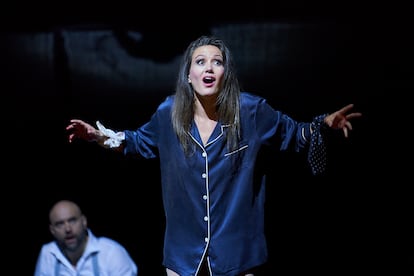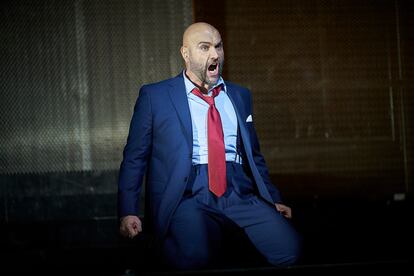William Christie would have liked to ask George Frideric Handel what intrigues every human being: what is after death? If he has been up there or down there all this time and, in the event that there was no life after death, then if life would be his operas. Confesses it in a promotional video of the return of Julius Caesar To Liceu last Sunday, May 25, after more than twenty years of absence, and in a co -production of Calixto Bieito released in Amsterdam two years ago. It was the debut of the legendary US director of Les Arts Florissants of 80 years at the Barcelona Theater in front of the starting orchestra, which first used period instruments. An opportunity to enjoy its humanist handle, which also underlines in the aforementioned video: a composer of the eighteenth century with the power to carefully portray the human condition and allow the current public to recognize themselves in their operas.
This idea connects with the scenic proposal of Bieito, which transfers the action of the successful 1724 handle opera from the Egypt of the year 48 a. C. to an environment close to the current taste. Rebecca Ringst’s scenery, formed by a metal cage that is turned and elevates on one of its sides until evoking the Saudi Arabia pavilion at the Dubai 2020 Expo, has attractive and colorful videos of Sarah Derendinger. But theatrical tension is again a problem for the Spanish stage director, as has already happened at the start of his management of THE NIBELUNGO RING Wagnerian in Paris, and each character seems improvisedly built from what their singers offer. A low theatrical level that contrasts with the scenic brilliance seen in other update productions of Handel, such as Orlandoby Claus Guth, and Theodoraby Katie Mitchell. The insubstantial Ingo Krügler costumes, which does not distinguish between Romans and Egyptians, also did not help. And it was a ballast the opera division into two very extensive parts, which dilute the division into three acts and use the Avengeive Aryan of Sesto without weight The angue offended never rests Como Cesura.
The lack of performing ideas caused the first part, with almost two hours, to affect music. Christie nerve the overture nerve and drove the first scenes with solemnity, intensity and precious. But everything was diluted in a more or less bland correction, as was clear in the accompanied recitative Soul of the Great Pompeo or in the Aryan It should be tacit and hiddenwhere the orchestra covered the soloist, although he traced at specific times, as in the beautiful duo between Cornelia and Sesto that closes the first act They are cream to tear. The decisions about Handel’s score were, in general, successful, with understandable dyeing in recitatives and some surprises, such as the suppression of the Aria de Cleopatra You my star arewhere shows its most human and less pragmatic channel, in favor of the insubstantial aria of the Nireno eunuch Who loses a momentthat Handel wrote for the replacement of 1725, but not for a target castrato, but for a soprano.
Everything improved in the second part and especially in the third act where Christie precisely handled the fundamental rhetoric of Aria chiefwith that sequence that defines as Inizio-Confutation-Confirmation. He demonstrated it in the masterful accompaniment of the Aria of Cleopatra, I will cry my fate. The Orchestra of the Great Teatre of the Liceu shone with period instruments: a ductile and dense rope, good wood and four powerful natural tubes, which showed themselves in the symphony with which the epilogue opens. The scenic direction of Bieito, in charge of Astrid van Den Akker in this replace kitsch With ostentatious golden veteres. All this occurrences that did not raise the theatrical level or the psychological construction of the characters.

The great winner of the night was Julie Fuchs, who played Cleopatra. The Meaux soprano exhibited its scenic self -confidence since the first intervention and converted the ARIA From stormy wooden woodwho sings in the third act full of joy after his reunion with Giulio Cesare, who saves her from suicide, at the best of the night, accompanied by another flash from Christie’s pit. However, the French singer did not shine so much in the most emotional moments of the character written by Handel for Francesca Cuzzoni, as in the recitative accompanied by the second act and Aria If pity of me do not hear. The Catalan contractor Xavier Sabata solved the challenge of playing the leading role, written for the Castrate Senesino, and started the first applause of the night after his technical exhibition in the Aryan Empio, I will say, you are. However, his meliflua version of Giulio Cesare did not delve deeper into the character’s psychology to raise the most outstanding numbers of the opera, as the accompanied recitative and the Aryan Aria From the hidden peril.
On the contrary, the Cameron Shahbazi contractor, who debuted in the Liceu, printed an effective sinister tone to the inconsistent and evil Tololese. This is another character originally written for Contralto Castrate, that the Canadian of Iranian ancestry raised in his first Aryan The hempio, unfair, unworthy. Another highly applauded debutant was the mezzo-soprano British Helen Charlston in the role of Sesto, who highlighted in Aria Dear Speme With exquisite musical fluctuations, a slight roasted tone and attractive ornamentation. His Italian colleague Teresa Iervolino was a cornelia as austere as elegant, and the Murcian baritone José Antonio López was a bad convincing as an Achilla counselor. The cast was completed with the Galician contractor Alberto Miguélez Rouco, who solved the aforementioned Aryan of the Nireno Eunuch, and the young Barítone Baritone Jan Prem, who participated in the recitatives as a curio tribune, but also in the choirs, timely converted into vocal sets, as indicated in the score of Handel.
Julius Caesar
Music by George Frideric Handel. Libretto by Nicola Francesco Haym (based on the homonymous libretto of Giacomo Francesco Bussani).
Xavier Sabata, counter -year (Julius Caesar); Julie Fuchs, soprano (Cleopatra); Cameron Shahbazi, counter -year (Ptolemy); Teresa Iervolino, mezzo-soprano (Cornelia); Helen Charlston, mezzo-soprano (Sesto Pompeo); José Antonio López, baritone (Achilla); Jan CV baritone (Curio); Alberto Miguélez Ruco, counter -year (Nest).
Symphony Orchestra of the Great Teatre del Liceu.
Musical address: William Christie.
Scene address: Calixto Bieito. Replacement: Astrid van den Akker.
Great Teatre del Liceu, May 25. Until June 7.

